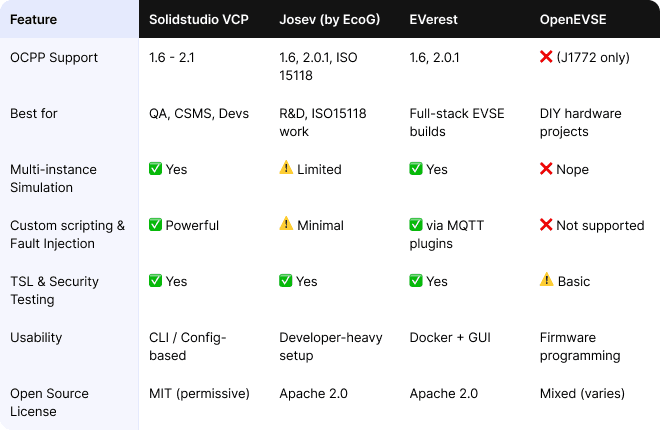Let’s be honest, building and testing backend software for EV charging isn’t exactly plug-and-play. You’ve got OCPP versions to juggle, APIs to wrangle, and integration tests that never quite run the same twice.
Enter the charge point simulator, a sanity-saving tool that simulates a physical charger so you can confidently get back to building, testing, and shipping.
In this guide, we’ll explain a VCP, compare the top open-source options, and show you why Solidstudio’s Virtual Charge Point is built for folks who care about clean, scalable, test-ready charging infrastructure.
What’s an OCPP charge point simulator?
Think of a flight simulator, but for EV chargers. No hardware needed, no cables to trip over. Just pure, emulated OCPP goodness.
With an OCPP simulator from Solidstudio (Virtual Charge Point), you can:
- Simulate OCPP 1.6 to 2.1 sessions from boot to charge stop
- Emulate real-world scenarios like authorization failures, power fluctuations, or surprise disconnects
- Run full QA pipelines without waiting on a test station to reboot
- Test CSMS scalability before production hits you like a 350kW lightning bolt
Check our Virtual Charge Point tutorial
When is a charge point simulator useful?
- During backend development (especially CSMS)
- In automated CI/CD testing
- For OCPI roaming or eMSP validation
- When you want to stress test or break stuff, on purpose
The charge point simulators comparison: Who’s got what?
Let’s break it down. Here’s how Solidstudio’s Virtual Charge Point stacks up against some of the better-known open-source alternatives:
charge point simulators comparison table
TL;DR? If you’re after fast, flexible, code-driven testing for commercial EV infrastructure, you should look closer at Solidstudio’s VCP.
Why teams choose Solidstudio’s VCP
We built our VCP with one goal: to make life easier for developers, testers, and engineers working with OCPP backends. There is no bloat, no distractions, just a smart, scriptable tool that lets you focus on what matters, validating your charging software.
Here's what sets it apart:
- True-to-life simulation: From power-up to plug-out
- Custom scenarios: Reproduce edge cases, simulate outages, tweak timing
- Scale-ready: Spin up dozens (or hundreds) of virtual chargers with ease
- Built for pipelines: Integrates with your CI/CD flow like a charm
- Secure by design: Yes, we do TLS and certificates
You’ll love it if you’re:
- A CPO testing CSMS performance before rollout
- An eMSP verifying OCPI integration and roaming logic
- A QA engineer looking to automate the boring bits and focus on what breaks
🐈⬛Explore Virtual Charge Point on GitHub
The other guys (a quick look)
1. Josev
Great if you’re deep into ISO 15118 or researching bidirectional charging (V2G). But what if you focus on backend scale testing? Might be more than you need (and less than you want).
2. EVerest
Built by the LF Energy folks, this one's modular, MQTT-based, and perfect for station-level dev. Just know: it’s heavier to configure and slower to set up for quick test loops.
3. OpenEVSE
OpenEVSE is firmware, not a simulator. Super popular in the maker scene. Not helpful if you’re writing backend code or debugging CSMS behavior.
Test your charge point smart, not hard
Let’s keep it simple, if you’re testing an OCPP backend, Solidstudio’s Virtual Charge Point is a no-brainer. Josev is great for ISO 15118 and V2G research, EVerest shines if you’re deep into embedded stack dev, and OpenEVSE is perfect if you're the hands-on hardware type.
But here’s the real takeaway:
If you’re serious about building reliable, scalable backend tools in the eMobility space, you need a VCP that keeps up with your pace and precision. One that doesn’t slow you down or force you to hack around limitations.
Solidstudio’s Virtual Charge Point is built for exactly that. It’s fast to spin up, endlessly scriptable, and rock-solid in real-world test environments. Plug it into your workflow, and see how much smoother everything runs.


